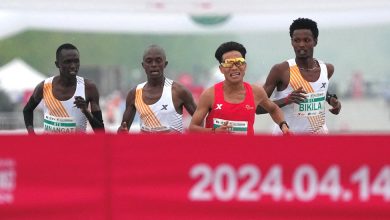France’s Olympic Teams Get a New Look: Vintage

ROMILLY-SUR-SEINE, France — When France’s athletes enter the Bird’s Nest stadium for the opening ceremony of the 2022 Beijing Olympics in February, Josette Camuset will be paying close attention. It has, after all, been a long wait.
For the first time in 50 years, the French team will be dressed in outfits manufactured by Le Coq Sportif, the storied French sportswear brand created by Camuset’s husband, Roland, more than 70 years ago, transforming the local textile company set up by his father, Emile, in 1882.
In this sleepy town on the banks of the Seine, the sight on the French team’s uniforms of the company’s logo — a proud-chested cockerel — is perhaps the most potent example to date of the effort to revive a famed, but fallen, French brand that once supplied the gear of choice for tennis stars, World Cup champions and famed Tour de France cyclists.
“It is a sign that says, ‘Let’s go,’” said Marc-Henri Beausire, Le Coq Sportif’s current proprietor.
Beausire, a Franco-Swiss businessman, is the latest figure to try to revive a company that, long removed from its 1950s heyday, has struggled to maintain relevance for much of the last three decades. When Beausire’s company, Airesis, picked up the nearly bankrupt brand in 2005, it was buying not so much a proud French retailer but the memory of one.

Marc-Henri Beausire, the current caretaker of Le Coq Sportif’s business and its history. The company has returned some of its production tasks to its original factory in Romilly-sur-Seine, France.
In the decades before the Camusets lost control of the company they had built, Le Coq Sportif had enjoyed an unusually prominent profile as sports began to professionalize. The company, for instance, produced the first yellow jersey worn by the Tour de France race leader in 1951. It dressed the tennis legend Arthur Ashe when he won the 1975 Wimbledon men’s singles championship and the French star Yannick Noah when he captured the title at Roland Garros eight years later. The great Dutch soccer team Ajax Amsterdam wore Le Coq Sportif when it won three straight European Cups in the early 1970s, and Diego Maradona had the brand’s cockerel on his chest when he won the 1986 World Cup with Argentina.
Get Ready for the 2022 Beijing Winter Olympics
Just a few months after Tokyo, the Olympics will start again in Beijing on Feb. 4. Here is what you need to know:
- A Guide to the Sports: From speedskating to monobob, here’s a look at every sport that will be contested at the 2022 Winter Games.
- Diplomatic Boycott: The U.S. and several other countries will not send government officials to Beijing, protesting China’s human rights abuses.
- Covid Preparations: China is tightening restrictions, including plans for a “closed-loop” bubble. And N.H.L. players won’t participate after all.
- The Fashion Race: Canada partnered with Lululemon for its Olympic kit, and a Black-owned athleisure brand will outfit Team Nigeria.
By then, the brand was visible mostly as a subsidiary of Adidas, which secured control of it — which for years supplied designs to Adidas in return for the German company’s expertise in shoe production — after the Camusets defaulted on debts from a failed expansion plan. But the company’s fortunes quickly deteriorated after the death in 1987 of Horst Dassler, Adidas’s chairman at the time, and it soon cycled through a series of failed owners.
During its first four years under Beausire, Le Coq Sportif — shorn of an identity and barely viable as a business — was going nowhere. Frustrated, Beausire decided something needed to be done.
He called together his closest aides, a small group that included Noah, and over several bottles of wine in the bar of Paris’s upscale Hotel Costes they settled on an idea. It was time to get back to basics, the group decided. That meant reconnecting with the company’s past. And that led Beausire to Josette Camuset, and to the family’s last factory in Romilly-sur-Seine.
Closed in 2000, the facility had stood empty ever since, a monument to the past. Beausire decided to make it the site of the company’s revamp, a brick-and-mortar representation of his vision to reimagine Le Coq Sportif as a French brand committed to local production.
“We have gone back to the thing that made us die,” Beausire said in an interview in the factory’s glass-walled conference room. The facility, he added, “symbolizes the rebirth.”
Beausire did not just want Josette Camuset’s blessing or her building, though. He also wanted something even more sentimental: the archive her husband had assembled tracking everything his company had ever made — every design change, every idea for a new clothing line, every tweak to the company’s logo.
“It’s like a jewel that stayed with her — she was keeping the secret,” Beausire said. Persuading Camuset to reveal it was not easy. He met with her several times before she agreed to let him even look at the files locked away in the family home, a former maternity hospital where decades earlier her own children had been born.
“It made me cry, it was very emotional,” Camuset said of the day she allowed Beausire into the room that told the story of Le Coq Sportif and, by extension, her family. When the light flicked on, Beausire was amazed by what he saw: a trove of dusty boxes containing sporting relics, fabric samples and clothing patterns chronicling the company’s glorious past. Louison Bobet’s Tour de France jerseys. Noah’s white tennis shirts. Maradona’s striped Argentina top.
Camuset, 83, eventually agreed to part with both the factory and the main archive, a book that staff members described as the company’s “bible.” As part of the deal, Beausire also restored a link to the founding family by giving Camuset a small share of the business and a place on its board.
The rebirth has been bumpy. According to Le Coq Sportif’s latest accounts, the brand’s losses doubled in 2020, to 20 million euros (about $22.5 million), as the company experienced plummeting revenues related to the coronavirus pandemic.
But Beausire is doubling down. A former textile mill next to the factory is being refurbished, and he said that he plans to triple the size of the work force in Romilly. The company’s turnover tumbled almost 35 percent, to 90 million euros, last year, or about three times less than Adidas makes from its French operations. But Beausire wants Le Coq Sportif to become synonymous with its home country again, and speaks with pride of his goal of one day surpassing Adidas in sales in its home market.
To achieve that, Le Coq Sportif has been signing contracts to outfit widely known sports teams with historical relevance to the company and the country, including the French soccer team St.-Étienne and, more significantly, France’s national rugby team, which returned to the fold after ending a contract with Adidas.
Those relationships, that local connection, are felt by the workers who stitch together the clothing the nation’s stars will one day wear. “There’s pride to see them wear our material,” Marie-Helene Durupt said as she put the finishing touches to a jersey the rugby team would wear in a game against New Zealand.
Winning the Olympic contract became a focus at the company as soon as Paris secured hosting rights to the 2024 Summer Games, which will take place 100 years after the city first held them. The Camuset-run firm that became Le Coq Sportif had dressed the French athletes then, and the company was determined to do the same this time, too.
To win the contract, executives put together a bid that talked up the company’s homespun credentials — Le Coq says 90 percent of the materials used in its textile products are now sourced domestically — and offered up an image of a company that sought to be an ambassador for France alongside the athletes who would wear its clothing.
The agreement they reached means that every time a French athlete wins a medal in 2024, the cockerel logo that Roland Camuset, who died several years ago, first designed while completing his military service in 1948 will be returned to a place of honor as well.
“We were with the Olympic team of France from 1912 to 1972, so it’s absolutely in our DNA,” Beausire said.



